
Apparently the ICF wants even fewer people watching paddle racing live streams…
In a move that can only be described as “federation-like,” the ICF aka the International Canoe Federation aka the canoe boys have somehow devised a plan to get even fewer people watching paddle racing by placing their live streams behind a perplexing paywall.
After gaining a groundswell of respect and recognition over the past few years, the Johnny-come-latelies of SUP looked set for a triumphant celebration in Thailand later this year as the 2023 ICF Worlds were on track to become the biggest and most-watched event of the season. Alas, in one fell swoop this byzantine federation has stalled mid-stroke and signaled their honeymoon love affair with our humble little sport – indeed their love for fans of any paddling discipline – may be coming to an abrupt end like a shotgun wedding in Vegas on a sorry Sunday morning.
In my humble opinion and I presume you’ll agree with me here fellow paddling enthusiast, the cherry on top of any major SUP race is its live stream (apart from the afterparty of course, which will surely be one to remember in the infamous underbelly of Pattaya). And when it comes to live streaming, Olympic federations – both canoeing and surfing – do a very good job. In fact it’s probably what they do best. With event budgets that no smaller race could ever compete with, the ISA and ICF Worlds have generally been the most-professional broadcasts in the sport. They make SUP Racer-and-his-baguette-microphone appear to be innocent, childlike productions from a bygone era.
So it’s with confounding confusion that the canoe boys – just as they had seized the initiative, momentum and general patronage of the paddling community – would pull a move that will surely set both themselves and our sport back a good board-length or two.
In case you missed the bizarre announcement earlier this year, from now on the ICF will *exclusively* show their live events on a hitherto-unheard-of website called Recast. No more YouTube Live, no more Facebook Live, only Recast.
This wouldn’t really be an issue if Recast was a mere clone of YouTube but alas the only similarity is that both platforms are capable of showing moving pictures in real time. The likeness ends there as Recast takes live streaming off on some Orwellian tangent that requires either direct payment or soul-sucking ad-watching in order to view anything.
Basically, you now have to pay to watch an ICF race, either by literally paying or by signing your privacy away and agreeing to sit through mind-numbing ads in order to earn “credits” that extend your viewing time like something out of Orwell’s prophetic novel 1984.
But while many in the SUP world seem to have missed the announcement of this mind-boggling move earlier in the season, the hardcore canoe/kayak fans certainly didn’t — oh no and boy were they pissed. Indeed, the ICF’s generally-pedestrian social media slots were instantly overrun by angry fans who were none too pleased with their federation’s strange new direction.
“Congratulations guys, your endless desire to make profits is actually killing our sport” seemed to sum up the mood. Several kayakers not only voiced displeasure but penned entire essays laying out why this is indeed a mind-numbingly backwards decision. It was, quite simply, a backlash. And an angry one at that.
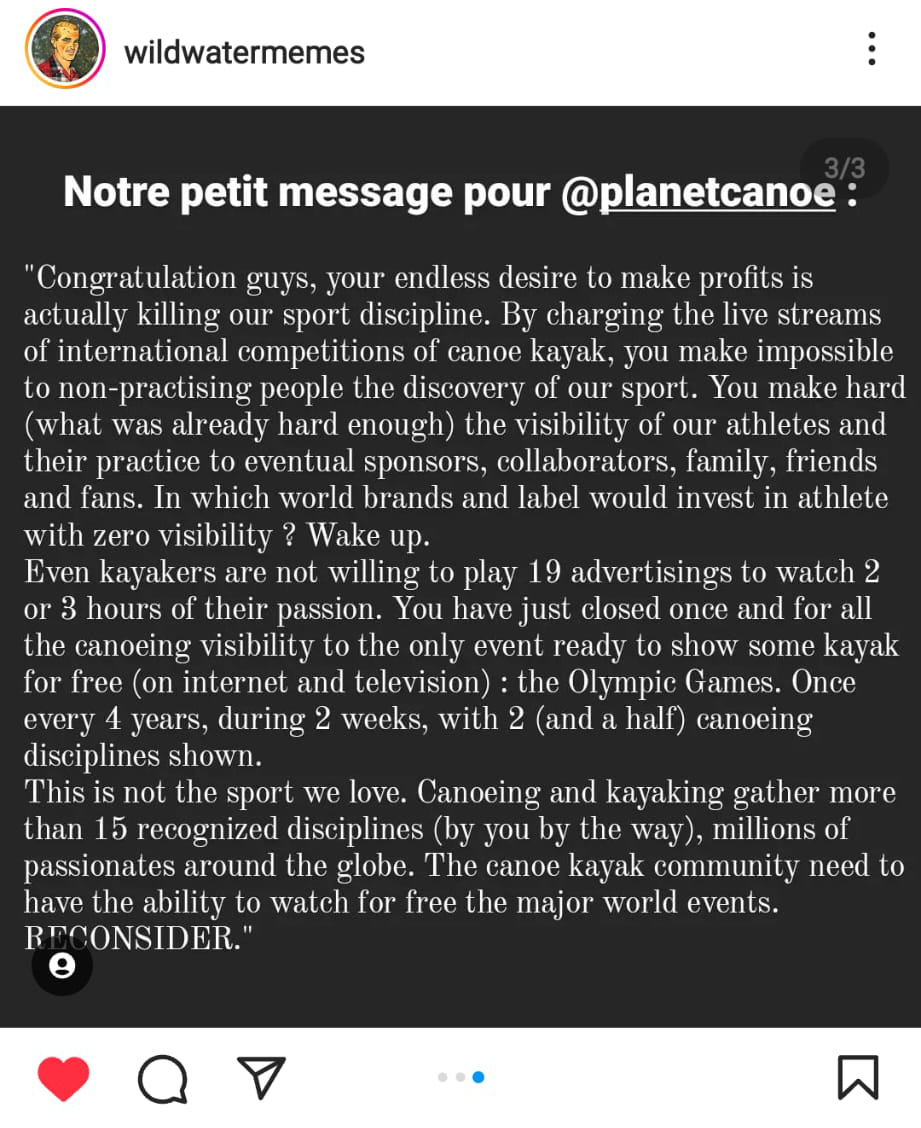
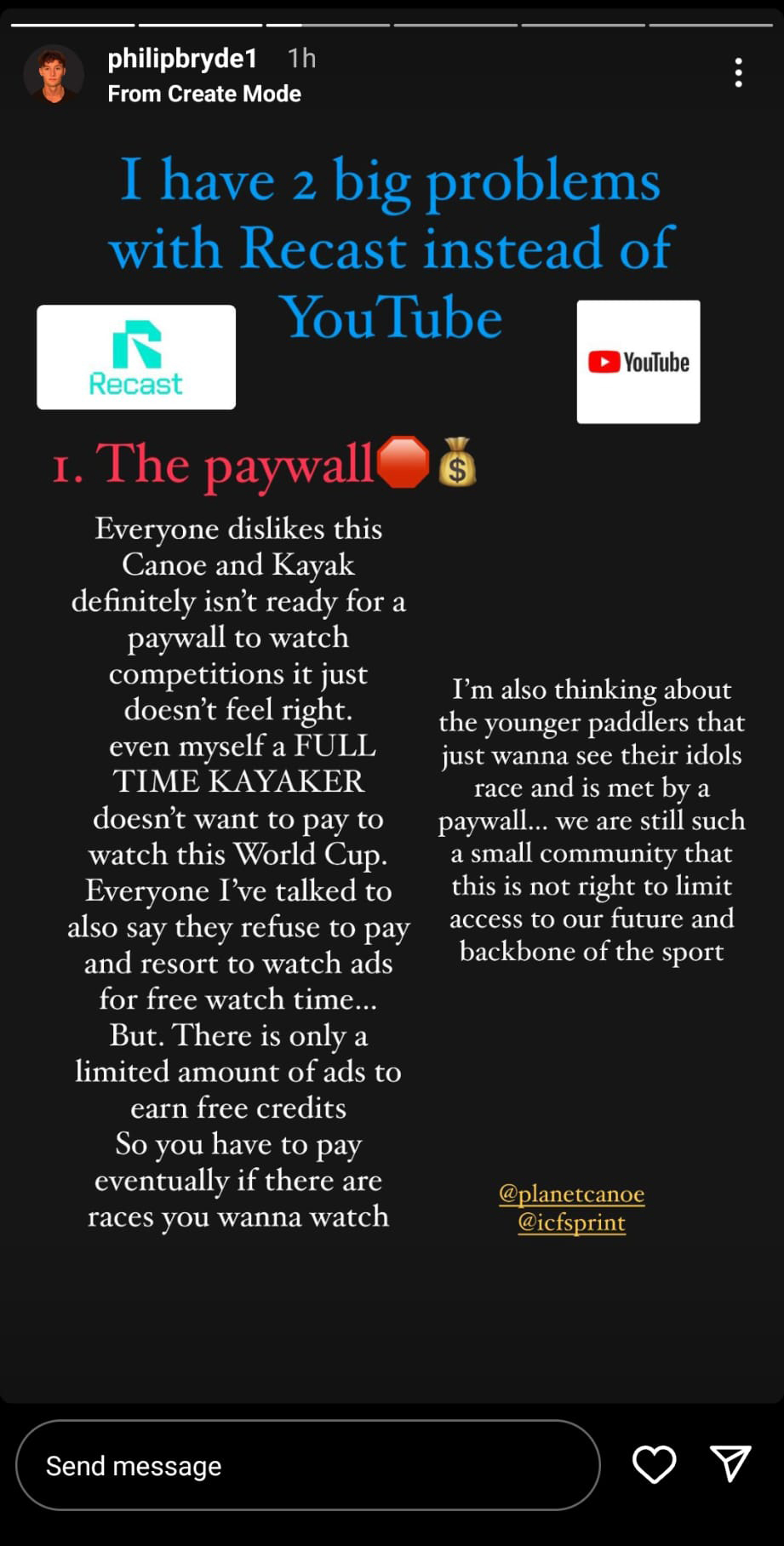
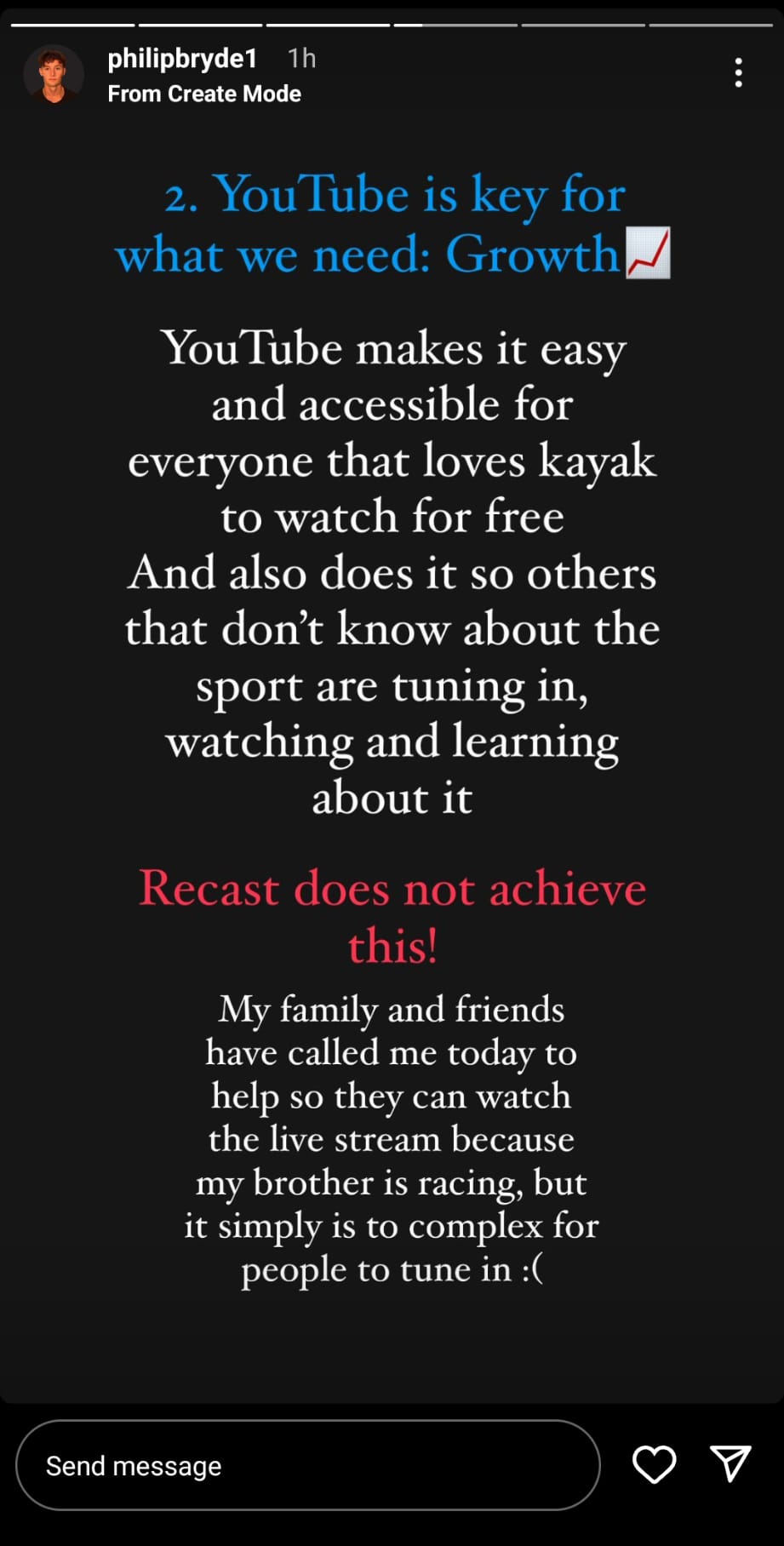
In addition, the original announcement on the ICF’s Facebook page was flooded by fans who were none too impressed.
Here’s a small selection of the wrath:
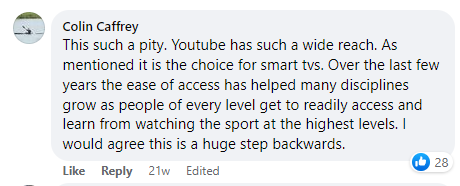


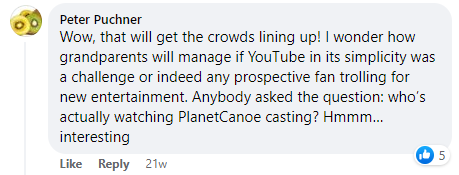


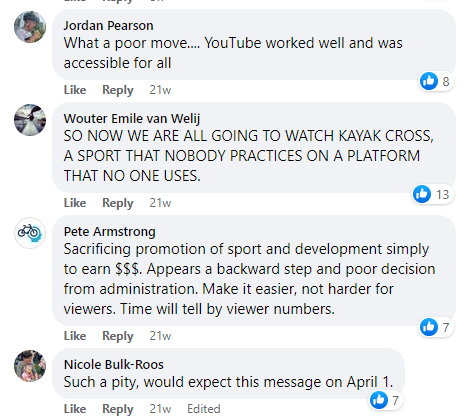


And it wasn’t just the fans who were sharpening their pitchforks — U.S. canoe hero Ian Ross also made his feelings clear…

…while U.S. national record holder Kenny Kasperbauer let rip:
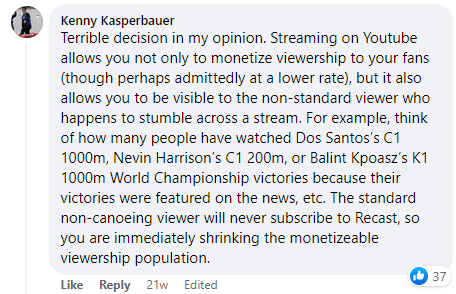
Though perhaps the most succinct response came from the head of Ukraine’s SUP federation and community leader Andriy Liuty-Liutenko:

Update: The SUP community has heard the news and as you’d expect they’re not thrilled either. Read the reaction in the Instagram comment section
As these and many more comments laid bare, enthusiasts of seated paddling were left perplexed and I for one wholeheartedly agree — both with the fact that paddling sitting down is actually pretty fun and that the ICF’s decision to go behind a paywall will prove to be a momentum-killing blunder of epic proportions.
The problems with switching to Recast are myriad but in addition to the comments above I’ll try my best to summarise just in case the ICF executive board is ever open to the idea of being reasonable and rethinking this crazy decision.
1. Making it harder for fans to watch your sport is a surefire way to get fewer fans watching
This one is kinda obvious, no?
Paddling in its various forms isn’t exactly a head-turner. We have relatively small audiences to begin with and you’d think any self-respecting federation would be trying everything to grow those numbers. But no, the ICF seems hellbent on ensuring even fewer people watch live paddle racing.
Recast not only acts as a barrier with its paywall (or its “freemium” version if you want to sit through those soul-destroying advertisements) it’s a barrier by simply being Recast.
Virtually everyone knows how to use YouTube including core fans, casual viewers and even the occasional grandparent who can simply switch on their Samsung Smart TV and easily find a live YouTube broadcast of their athletic offspring with the touch of a few buttons. Try putting Recast on your TV. I did. It’s bloody awful.
The app situation is just as bad. For while criticism of YouTube’s own advertising and privacy policies are often warranted, one comment I’ve never heard is that their app is hard to use. Watching anything on YouTube is a breeze. I cannot say the same about Recast.
And in a truly bizarre twist, one of the ads I repeatedly had to watch in order to earn my Orwellian viewing credits was a promotion for Recast itself…
2. YouTube has discovery; Recast isn’t even on the map
YouTube (and Facebook Live) has such a large, active community baked in that paddling live streams don’t just instantly reach the full width of their existing audience they can often tap into new audiences — an essential element for growing niche sports. It’s called “discovery” and apparently it’s a big deal in the world of sports marketing, the book of which the ICF just incinerated in a dumpster out back of their expensive offices over there in Lausanne, Switzerland.
Even if the percentage of new fans watching each race is small, at least with YouTube you’re heading in the right direction at worst and growing the sport at best. By contrast, the only people who’ll now be watching an ICF live stream on Recast are the die-hard fans — because you’re only watching Recast if you’re willing to jump through hoops.
Goodbye, casual viewers, and farewell, potential new fans.
3. YouTube and Facebook have a feeling of community; Recast is cold and isolated
When I tested Recast during a recent canoe/kayak world cup, what struck me wasn’t the byzantine paywall or technical difficulty but the sheer isolation I felt while watching.
As someone who has produced, promoted and commentated in more than a hundred paddling live streams, I can say from deep personal experience that the best part of any broadcast is the fans. Thanks to the fans, watching a small race in Europe can feel like you’re sitting in a packed stadium as passionate paddlers from around the world flood the comments section with their own insights and reactions in real time. The moments I remember being most excited while commentating were when I could see and interact with the fans. I would gain immense energy from the audience and they perhaps felt the same as our combined passion created a positive feedback loop that made the entire broadcast more enjoyable for everyone.
Recast doesn’t just kill that positive feedback loop, it bludgeons it to death with a blunt paddle.
Recast is missing the mandatory chat box so loved by fans and there’s not even a viewer counter to show how many other people are actually watching. For all you know you could be the only person viewing the race. It’s a cold, disheartening experience that inspires neither excitement nor enthusiasm. There’s simply no passion with Recast; suddenly that packed stadium feels completely empty.
I can’t understand why Recast even exists. It sucks.
4. I would bet Recast doesn’t even bring in the dollars…
The entire reason the ICF has made this bizarro balls-up wasn’t to piss of its fanbase despite ample evidence to the contrary, it was a purely financial decision their executive board figured was worth the effort and potential pushback (though presumably they didn’t anticipate such hostility).
“We need to make our broadcasts more sustainable. We need more revenue! Don’t you guys get it?!” they must have screamed in frustration from all the way over there in Switzerland in response to the angry mob of pitchfork-wielding paddlers upon announcing this bold new direction in live broadcasting. And I hear ya, ICF, I hear ya. I know how hard it is to make paddling live streams financially sustainable.
Recast’s simple selling point to sporting leagues and federations has been that it can generate you some good money thanks to its paywall and ad-watching-credit system. And on the surface that almost makes sense, right? Money is unfortunately necessary — live productions of the quality seen from the ICF are expensive. But I can’t help thinking there was a better option staring the canoe boys in the face all along, one that wouldn’t have prompted the fanbase to grab their pitchforks and jump on the next train to Lausanne.
Recast’s revenue sharing model is actually fairer than most platforms including YouTube — the vast majority of dollars earned through the paywall and ad-watching go back to the broadcaster, in this case the ICF. The problem is that with fewer viewers on Recast vs YouTube – for all the reasons listed above and then some – you’re chasing a slice of revenue from a smaller pool. Not to mention you’re also pissing off your core fans and hindering potential audience growth, both of which add an intangible but clearly negative financial cost to proceedings.
So is it really worth it?
I did some rough calculations and concluded the federation would only be earning a couple of thousand dollars per event at best. Multiply that by roughly a dozen major races and the canoe boys might earn an additional twenty or thirty grand per year by switching to Recast. That’s chump change for an organisation with an annual operating budget of some four million dollars thanks to its cut of, ironically, free-to-air Olympic broadcasting royalties.
The ICF has sold out its fans for pennies.
But the most hair-pulling aspect of this entire fiasco is that YouTube offered a superior monetisation option all along via its “Channel Memberships” — a Patreon-style program where hardcore fans can pay a monthly subscription to get VIP access while keeping the channel free and easily accessible for casual viewers.
And again, this isn’t even factoring in the indirect cost of attracting fewer viewers to Recast that potentially means a loss of event sponsorships due to declining numbers all round. All of which means that not only is Recast costing the ICF directly in terms of viewership and credibility, it may also be a net negative in terms of revenue. That would negate the platform’s entire raison d’etre and make this whole saga something of a Kafkaesque nightmare.
*breathe in, breathe out*
Is this an overreaction? Perhaps, but this rant comes from a place of passion and I think that’s what the ICF fails to appreciate. Live streams conjure passion among paddlers and that passion has a big impact on the sport well beyond the potential to earn a few grand here or there. Live streams on YouTube and Facebook help grow our sport; Recast sends us all backwards.
Perhaps I’m a little too passionate given my long involvement in our sport, but judging by the overwhelmingly-negative comments from the canoe/kayak community I’m not alone. Unless I’m watching a live stream on Recast, in which case I probably am.






You must be logged in to post a comment.